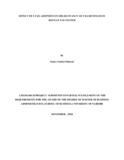| dc.description.abstract | For along time Kenyan government has been operating deficit budgeting due to the problem of inability to collect enough tax revenue to meet recurrent and development expenditures.Due to challenge of revenue collection, Kenyan government has been implementing a number of tax reforms with the latest beng i-tax.The current study specifically will assess effect of i-tax adoption on tax buoyancy in Kenyan tax system. The specific objectives includes: To analyze the tax buoyancies of the tax system in Kenya during the pre and post i- tax reform period and to examine the effect of i-tax system on the buoyancy of individual tax revenue sources in Kenya. The research used descriptive survey design, correlational research design .Secondary data was collected from the central bank of Kenya website well as Kenya Revenue Authority website. Data collected was summarized, coded and analysed using STATA version 14 .Study employed both descriptive and inferencial statistics .Inferencial statistics involved bivariate correlation and Multiregression analysis that helped generate model summary,coefficient of determination and t-statistics. Data containing the study results was be presented using tables together with associated explanations accompanying the table.The study found out that that all tax bases have grown since the introduction itax in kenya by Kenya Revenue Authority.Study found out that low tax base bouyancies suggest laxity and deficiencies in tax administration. As the economy changes, there should be constant review of the tax structure to improve on shortcomings in the administration of tax system.The study recommended that that tax evasion magnitude, composition, growth and determinants be estimated and handled to help minimize noncompliance as this effectively defrauds the government of legally due tax revenues, thereby reducing the government‘s ability to provide public services, while increasing the nation‘s debt burden | en_US |



